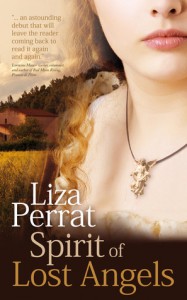Recommended to lovers of historical fiction, in particular women’s history and the French Revolution.

Thanks to Rosie Amber for organising Rosie’s Book Review Team and to the author for offering me a copy of the book that I freely chose to review.
I had recently read and reviewed Liza Perrat’s fabulous book The Silent Kookaburra (check the review here) and could not pass on the opportunity to read and review another of the author’s books. I had commented on my previous review that the author is well-known for her historical fiction novels and I felt The Silent Kookaburra, although set at a much closer point in time (the 1970s in Australia) also shared the detailed setting, the atmosphere and the background events that made it worthy of that category, together with a very disturbing and beautifully written story.
Spirit of Lost Angels falls neatly into the category of historical fiction. Set in France, a few years before the French revolution, it follows the life of Victoire Charpentier, a young girl born on a farm in a small village, whose mother is a wise woman, midwife and healer to all, and who experiences death and tragedy from a very early age. She is a direct victim of the unfairness of the society of the time (a nobleman’s coach runs her father over and doesn’t even stop) and it is not surprising she wants revenge. Tragedy and disaster pile up in her life and brief moments of happiness are cut short when something else happens. Her story fits also into the category of melodrama, as she always finds herself at the centre of everything, and survives against incredible odds. Her life demonstrates that a woman’s lot is (and was even more so at the time) hard. Losing your husband, children, being raped, accused of being a witch, and being denied a voice, are everyday affairs. One thing that helps Victoire above everything is her literacy. Her reading and writing skills help her keep in touch with loved ones, provide her later with a literary career and with the means to raise consciousness as to the plight of women and the poor, and allow her to meet people and make connections. Eventually, it also helps her fulfil her dream and have a happy ending. The focus on women’s issues and the importance of education are one of the strongest points of the novel for me.
The book is beautifully written, narrated in the first person by the protagonist, who presents as very articulate. As we learn later, she becomes very proficient at writing, although early on there are moments when the beauty of her writing jarred me a bit (when she writes a letter to her daughter Ruby, she’s trying to improve her writing, but her letter is not only deeply felt but also lyrically written in spite of that), although later events and the ending facilitate a different reading of the novel. The beautiful language and the detailed and, at times, poetic descriptions help readers feel transported to the France of the period and experience the smells (and stinks), the touch, the sensations of the different settings (including the horrifying experiences at La Salpêtrière). The historical figures and events of the time (Victoire meets Thomas Jefferson, corresponds with Mary Wollstonecraft and becomes friendly with Jeanne de Valois, who plays an important role in her life) add to the texture and background of the book, making the France of the late XVIIIc even more vivid. The author explains in an endnote that her main character is entirely fictional and all her interactions with historical figures are invented too, although inspired by the real characters.
I enjoyed, in particular, the reflections of the character about the role of women in the society of the time, her terrifying but enlightening period at La Salpêtrière, and her enterprising and determination. This is a novel full of action, where events follow each other quickly and the protagonist suffers more than anyone’s fair share of events, to the point where a degree of suspension of disbelief is required. Perhaps because we follow the character through a long period of time, and Victoire is very much a conduit to reflect historical events and the lot of women at that particular historical period, I did not feel her character was as consistent or psychologically well-drawn as was the case for Tanya in The Silent Kookaburra (where although we see the protagonist at two different ages, most of the story is told from the point of view of 11 y.o. Tanya). That notwithstanding, this is a great story, full of twist and turns, that will transport you to an extremely momentous time and place, and although it is the author’s first novel, it already shows her flair for language and for creating gripping stories.







